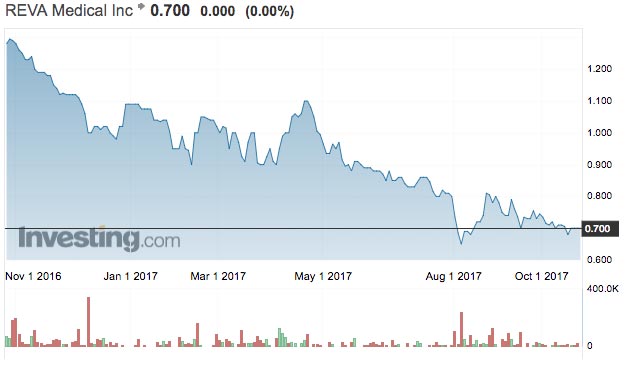Reva’s got revenue but doesn’t send the heart aflutter

Pic: sinology / Moment via Getty Images
Ahead of Reva Medical’s ASX listing in December 2010, the US-based bio-resorbable coronary stent developer targeted European regulatory approval for its product — then named Rezolve — by the end of 2013.
That took a tad longer than expected to Rezolve, with the company finally gaining approval for its heart scaffold, now known as Fantom, in April this year.
The so-called Conformité Européenne (CE) mark consent finally paves the way for Reva to market Fantom on the Continent and in June signed a German hospital as its first customer.
(If you really need to know it was the Kiel based stent specialist Universitätsklinikum Schleswig-Holstein).
Reva (ASX:RVA) is now selling in Germany, Switzerland and Austria, where it’s targeting hospitals that carry out 1000 or more stent procedures a year.
The devices started selling at the end of June, with the company accruing a modest $US41,000 ($53,000) revenue.
Notably, Reva does not have approval from the US Food and Drug Administration and is yet to apply, with no stated time-line for doing so.
The benefits of bio-resorbable stents
Reva competes in the $US3.9 billion stent market, with the bio-resorbable sub-sector currently worth a modest $US127 million.
In theory, bio-resorbable stents offer several advantages, one of which is they don’t have to be plucked out again when their work is done.
A tubular sleeve in a lattice formation, Fantom is made out of advanced polymers and is thinner than rival stents with “enhanced deliverability while being visible under X-ray”.
The scaffold is drug eluting, which means it can house and slowly release a drug to prevent the growth of cells causing the artery blockage.
The absorption allows for restoration of the ‘natural movement’ of the artery.
In a crucial test, a 240-patient trial (Fantom II) delivered a number of positive results: major adverse cardiac events (MACE) were limited to 4.2 per cent of patients after 12 months, with faster healing and no incidence of a condition called scaffold thrombosis.
The company has just reported interim results from a sub pool of 125 patients, showing a 5.6 per cent incidence of cardiac events after 24 months.
An expanded trial of up to 2200 patients (Fantom III) is scheduled for 2018.

Heart-wrenching tale of setbacks
The Reva story is typical of the setbacks faced by makers of bodily-inserted medical devices: they have to be tickety-boo for obvious reasons and the development times invariably become elongated.
Even before listing, the company spent $100 million developing the stent over 10 years. Along the way it was backed by Boston Scientific and Medtronic, with the latter remaining a Reva shareholder.
In a typical case of Founder’s Syndrome, co-founder, chairman and chief executive officer Bob Stockman stepped down in late 2015, in favour of ex-Medtronic vice president Dr Reggie Groves. Mr Stockman remains on the board, though.
Like Prime Minister Malcolm Turnbull, Reva is troubled by an Abbott: rival stent maker Abbott Laboratories, which cast a pall over the sector after recalling its Absorb bio-resorbable stent product in Europe.
This was after a clinical trial in late 2016 detected adverse events including elevated risk of heart attacks and blood clots.
Locally, the Therapeutics Goods Administration ordered the product to be recalled, while in the US the FDA has warned physicians about “adverse cardiac events”.
Absorb was sold in 100 countries and In September, Abbott said it had halted further sales due to low sales.
Cashed up
Fantom’s prospects were promising enough for unnamed investors to pony up a net $US34.6 million for unsecured convertible notes with attached options.
Morgans bio-watcher Derek Jellinek notes the company has stockpiled at least two years’ supply and estimates the initial market at 10,000 units with the potential for 25,000 units.
Dr Jellinek said in June that Reva’s peak sales for Fantom could be $US700 million in the US and $US300 million for the rest of the world.
A key negative is the inability to sell in the US, the home of obesity and coronary occlusions. Dr Jellinek warns the FDA bio-resorbables warning is “likely to hamstring adoption until more data alleviates concerns”.
Of course the US market is the crucial one to tap for any medical device marker.
To distort the words of former director Anne Keating’s ex-Prime Ministerial brother: “If you’re not in the US, you’re just camping out.” (St Paul of Balmain was, of course, talking about his beloved Sydney).
Given the lingering safety concerns, this one doesn’t send our hearts aflutter but at least the company is getting revenue through the door.
In the cheery words of Reva’s half-year filing to the US Securities and Exchange Commission: “Even if we do attain revenue we may never become profitable and even if we do … we may not be able to sustain profitability and cash flows on a recurring basis.”
REVA, by the way, derives from REstoringVAscular function and one can only ponder how much the brand guru’s invoice contributed to REva’s $US388 million of accrued losses over the years.
Disclosure: Dr Boreham is not a qualified medical practitioner and does not possess a doctorate of any sort. His knowledge of scaffolds extends only to building sites and Ned Kelly’s final minutes.
This column first appeared in Biotech Daily
This article does not constitute financial product advice. You should consider obtaining independent advice before making any financial decisions. The content of this article was not selected, modified or otherwise controlled by Stockhead. Stockhead has not provided, endorsed or otherwise assumed responsibility for any financial product advice contained in this article.
UNLOCK INSIGHTS
Discover the untold stories of emerging ASX stocks.
Daily news and expert analysis, it's free to subscribe.
By proceeding, you confirm you understand that we handle personal information in accordance with our Privacy Policy.








